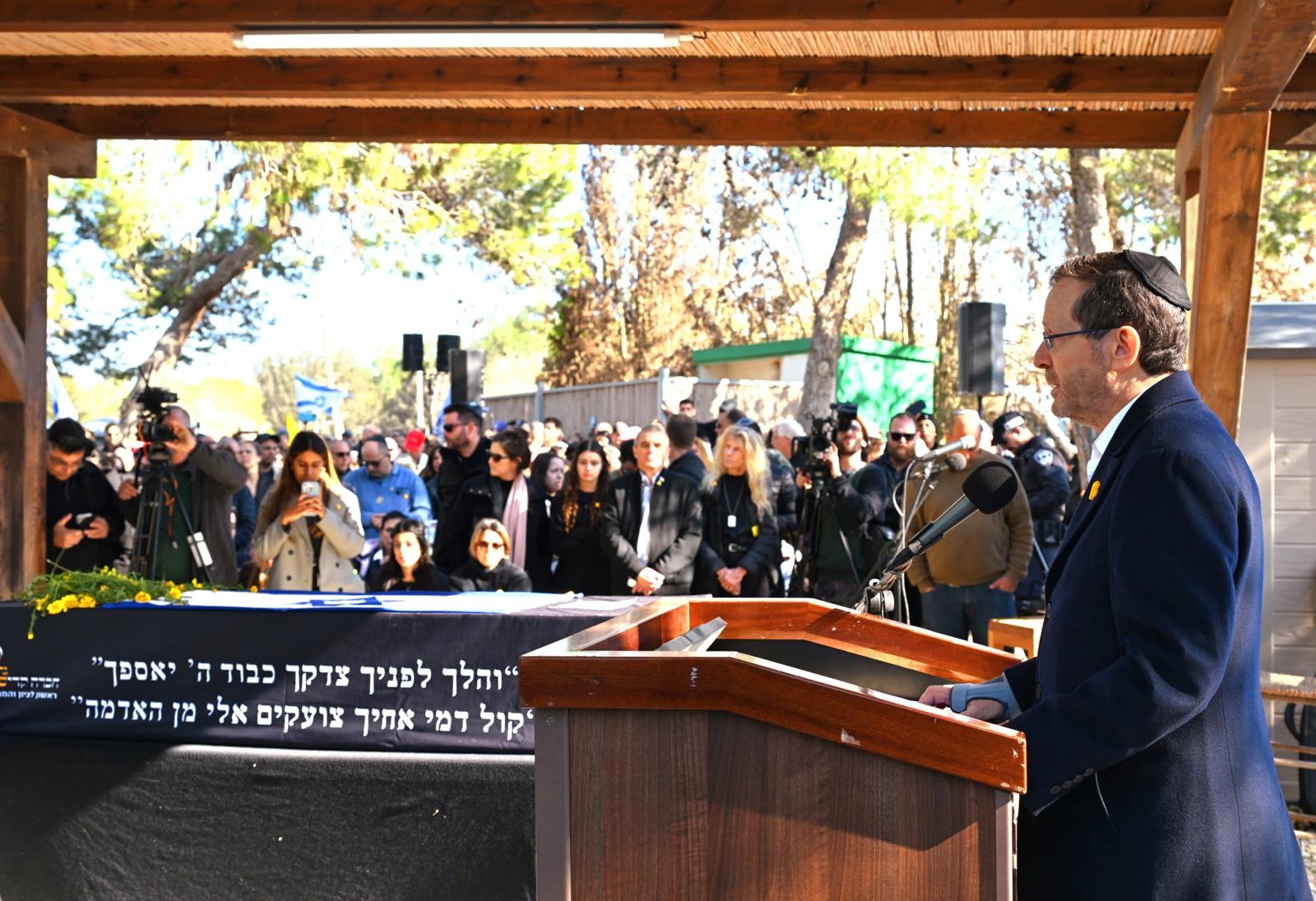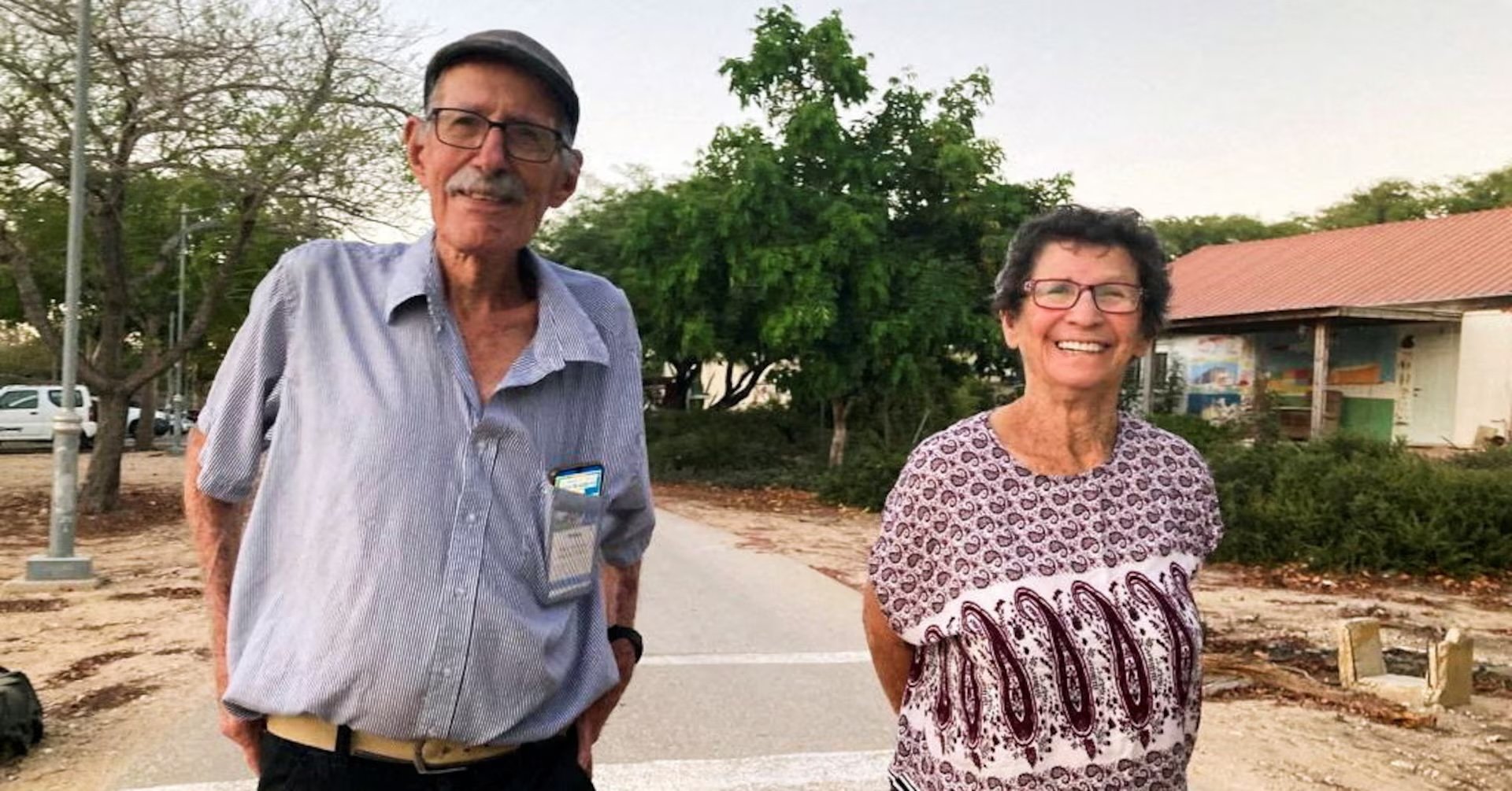


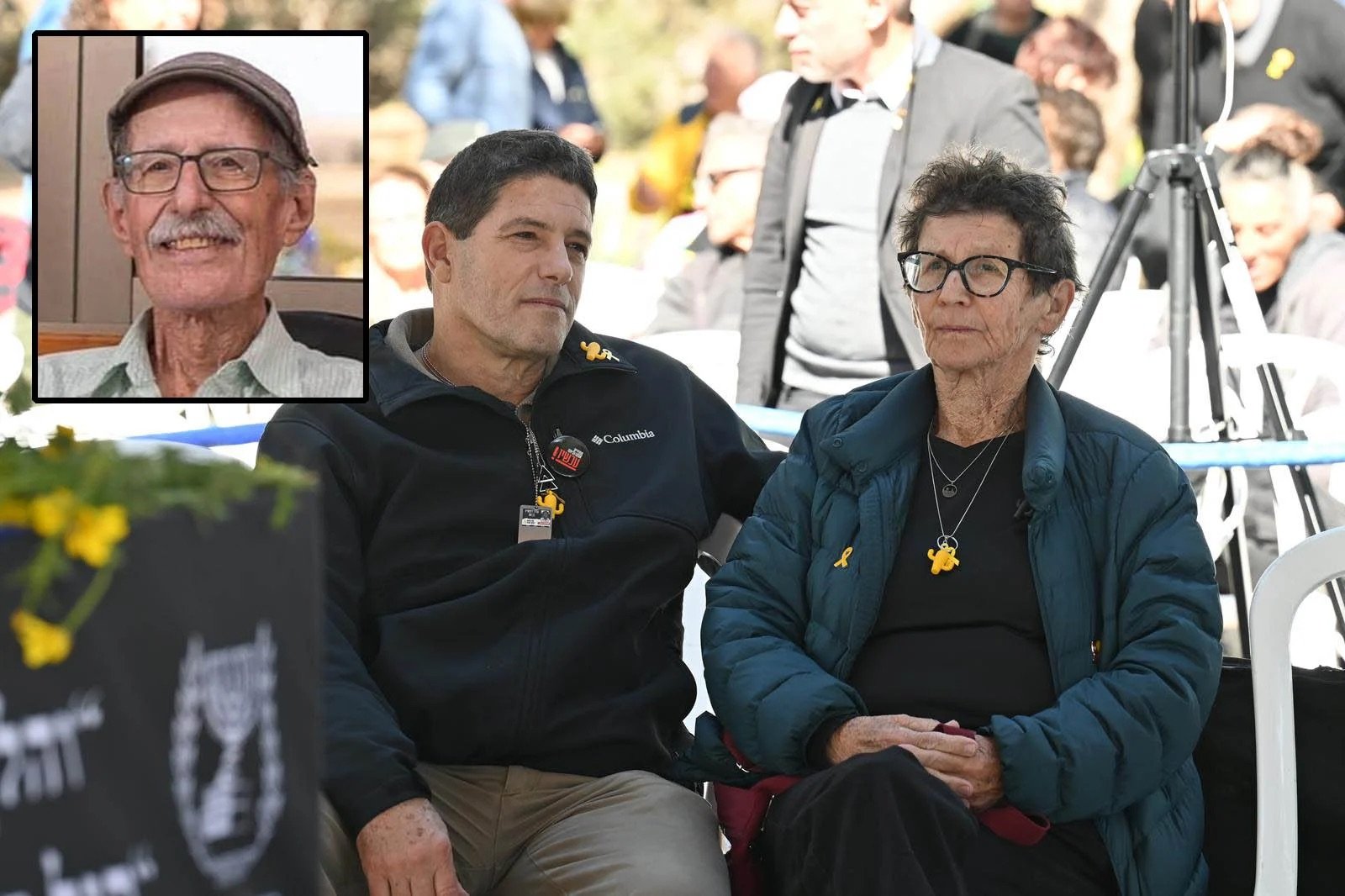
Family, friends and the president on Tuesday eulogized Oded Lifshitz, the 83-year-old peace activist who was taken hostage on October 7, 2023, from Kibbutz Nir Oz and slain in captivity, with his wife lamenting that he was killed by those he sought to help.
Lifshitz was laid to rest days after his body was returned from Gaza as part of a ceasefire-hostage release deal. He was buried in Nir Oz, a community he helped found 70 years ago, which was completely devastated in the Hamas-led assault with 117 of its 400 residents either killed or kidnapped.
Lifshitz, who was shot in the hand and then taken hostage by Hamas terrorists along with his wife, Yocheved, from their kibbutz safe room on October 7, was murdered in captivity by the Palestinian Islamic Jihad shortly after being captured, according to the Israel Defense Forces.
He was described by all as a man who loved playing piano, tending his cactus garden and traveling with Yocheved or ‘Yochke’, his wife of 63 years, often along with their grandchildren.
Yocheved Lifshitz, 86, who was released from captivity two weeks after being taken hostage separately from her husband, said their captivity shocked her.
“Our abduction and your death have shaken me to the core,” said Lifshitz at her husband’s funeral. “We fought all through the years for social justice, for peace. To my sorrow, we were hit by a terrible attack by those we helped on the other side. I stand here staggered to see the number of graves, and the terrible destruction of our community that was completely abandoned on October 7.”
Lifshitz says that members of the community are still held chained, held underground for more than 500 days and the government must get them all released.
“I’m not giving up,” she says. “I will continue to be part of this struggle until the last one returns home.”
Her message was repeated by other speakers, including President Isaac Herzog.
Herzog asked for Lifshitz’s forgiveness and for forgiveness that the country did not protect him, his family and his kibbutz, and that he had “to face these monsters alone,” he said. “Forgiveness that we were unable to rescue you and bring you and all your friends home from the clutches of the murderers—alive and in peace.”
The president called for the establishment of a state commission of inquiry, “the hallmark of a properly functioning country”—to courageously and professionally investigate everything that led to the October 7 disaster.
“This is a critical milestone on the road to healing, rebuilding, and strengthening our nation after this terrible tragedy,” says Herzog in a dig at Prime Minister Benjamin Netanyahu who has refused to establish such a probe.
Herzog also used the moment to memorialize the Bibas family, Shiri Bibas and her two sons, Ariel and Kfir, who were murdered in captivity in November 2023. Their bodies were brought back to Israel last week and buried in Nir Oz on Wednesday. No public officials were invited to the funeral.
“It is inconceivable that this very land will today and tomorrow receive Oded, along with Shiri, Kfir, and Ariel Bibas, may their memories be a blessing,” said Herzog, offering his condolences to freed hostage Yarden Bibas, husband to Shiri and father to Ariel and Kfir, aged 4 and 10 months when they were murdered.
Lifshitz’s son, Yizhar Lifshitz, teared up and apologized to his father for not being there to help save him during the October 7 Hamas terrorist attack. He named all of his father’s friends who were taken hostage and killed in captivity.
“Dad, you’re like Moses,” said Yizhar Lifshitz. “You were a real leader. We live in a complicated reality and we all need to decide what to do and you can’t tell us what to do in our nation, in our land.”
Daniel Lifshitz, one of Oded Lifshitz’s older grandchildren, familiar with the ongoing struggle for the release of hostages, said he participated in the fight for the hostages with everything he learned from his grandfather.
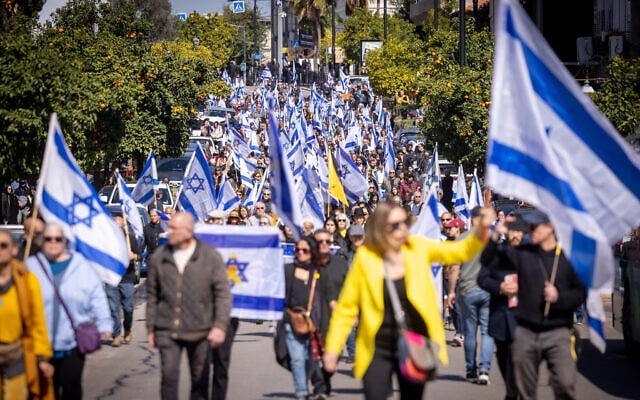
“I fought with all my strength, I was running in a new soccer field and you were there with me to show me the way,” said Daniel Lifshitz. “I learned from you about the Middle East, about how the world is actually so small, you taught me that people are good.”
Lifshitz’s grandchildren spoke of their grandfather’s love for Israel, and how he would talk them through complicated periods in Israeli life.
He was also a creative grandfather, who put them on his shoulders, turned garbage into recycled creations, showed them how to weed his cactus garden and believed in eating multiple ice cream treats a day.
Oded Lifshitz played the piano for his grandchildren, fell asleep on the couch only to wake up to his own snores, and taught them to love Israel and to fight for their political beliefs.
“We grew children and cacti, we traveled the world, we took our grandchildren to experience with us all that we loved,” said Yocheved Lifshitz in her eulogy.
Lifshitz’s children and grandchildren shared all they learned from their father and grandfather, born in 1940 in Haifa to parents who came to Israel in the 1930s from Germany and Poland. Lifshitz belonged to the Hashomer Hatzir youth movement from a young age and joined a group to establish Kibbutz Nir Oz while he served in the paratroopers unit during his army service.
Arnon Lifshitz said his father always knew how to help and do for others, and was deeply connected to the kibbutz, filling every kind of job, from the chicken coop to the administration.
“You loved your neighbor like yourself, you were always looking for a more equal society, you always knew how to help and do for others, and bring forward your own opinion,” said Arnon Lifshitz.
A lifelong friend, Shlomo Margalit, also from Nir Oz, shared that he had known Lifshitz since elementary school in Haifa.
He filled in the details of Lifshitz’s life, his army service with reserve duty that lasted for decades and included fighting in the Six-Day War, the War of Attrition, the Yom Kippur War and the Lebanon War.
Lifshitz earned his degree at Tel Aviv University and became a journalist, a left-leaning writer and a critical thinker who led the fight for the Bedouin to remain on their lands. He also volunteered to drive Gazans to Israeli hospitals for medical care in his later years.
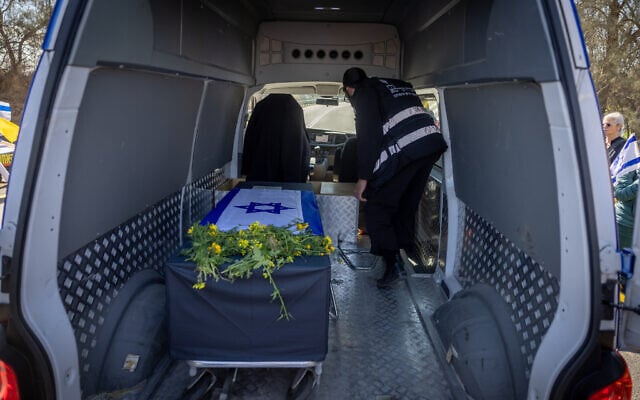
Margalit noted that they were a group of four young men who came from Haifa to build Nir Oz, including Amiram Cooper and Arieh Zalmanovitch, and now he is the only one left.
Oded Lifshitz’s daughter, Sharone Lifschitz, quoted her father’s writings and his words about absorbing the values of his fearless educator mother, even if it meant disagreeing with leaders, such as David Ben-Gurion.
She said her father always participated in efforts for peace and paid a personal price for some of his actions, including meeting with PLO leaders.
“‘I am not regretful for a moment, I feel satisfaction and pride,'” read Lifschitz. “‘I have aspired to follow in the enlightened path of prophets of morality and social justice.'”
Lifschitz noted that they were standing just meters from her parents’ modest kibbutz home and cactus garden, their personal institution that was destroyed on October 7.
“We bow our heads in apology and many others do,” said Lifschitz, with a final wish for memories of peace and love.
Lifshitz was buried in a coffin draped with an Israeli flag and a spray of wild yellow flowers, his Nir Oz grave covered with wreaths and bouquets.
“Dad, you’re here now, now you’re home,” said his son Arnon Lifshitz.


